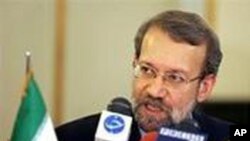Iran's parliament speaker Ali Larijani lashed out at U.S. plans to deploy defensive missiles in the Gulf, branding the decision a "political ploy" aimed at increasing its military strength in the region.
Larijani condemned the deployment during a parliament speech in which he also praised Iran's independent foreign policy set forth by Islamic Republic founder Ayatollah Ruhollah Khomeini.
Larijani says the U.S. decision to base Patriot missiles in four Gulf states, announced last week, was provocative and a threat to the region:
He says the US is justifying its plan to deploy the missiles by pointing to regional concerns over Iran. Unfortunately, he claims, Obama administration officials don't understand that the U.S. is the cause of the region's problems. The missiles, he complains, will cause concern to the countries where they are based, as well as putting U.S. soldiers at risk.
General David Petraeus, chief of the U.S. Central Command, said in several recent speeches that the U.S. was pursuing a defensive strategy in the Gulf, which included upgrading Patriot missile systems, which can now knock out missiles in flight. Iran possesses missiles with a range of 2012 kilometers that can hit Israel and U.S. bases in the region.
General Petraeus also told a Georgetown University audience 10 days ago that the U.S. now has eight Patriot missile batteries stationed in four Gulf states.
Mehrdad Khonsari of the London-based Center for Arab and Iranian studies believes that the U.S. move reveals a sea-change in the U.S. policy of engagement towards Iran announced by President Barack Obama, last year:
"The most important factor regarding the installation of these batteries in the Gulf countries is to indicate to the Iranians a change in tone of the United States government towards Iran. In other words, this act, coupled with Gen. Petraeus' comments ten days ago that the U.S. has the capacity to destroy all of Iran's nuclear facilities is a remarkable change in tone from the kind of gestures which the Obama government had made in the previous 12 months, when engagement was the focus of their attention. This indicates a harsher line: that the U.S. is preparing itself to face all kinds of inevitabilities and is trying to assure the Arab countries in the Persian Gulf that they will not be left at the mercy of Iran."
Arab leaders are privately said to be concerned about the increasing threat from Iran's military arsenal of missiles and the eventual threat of its nuclear potential.
Tehran continues to insist that its nuclear program is intended for peaceful, civilian purposes, but it has so far failed to agree to a U.N. draft nuclear deal to send 70 percent of its low grade uranium to France and Russia for further enrichment.
In a related development, Qatar's crown prince visited Tehran Tuesday according to Iranian state media and was shown meeting with President Mahmoud Ahmadinejad.










